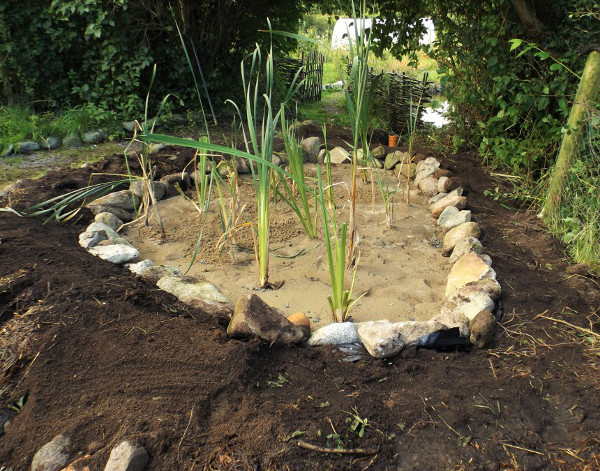Info, news & debate
Low-impact sewage treatment

Busted flush: why the big water corporations have to go
The catastrophic problems of privatised English water companies are well known. Sewerage function and drinking water supply are now more deficient than even before privatisation. Terminal failure was in-built from the start, within the cultural, operational, & regulatory processes applied. Correcting these foundational criteria can help inform the quickest resolution.

Local, community-based measures to prevent drought in arid regions
El Habib Ben Amara, an architect and urban designer from a tribal ksar (fortified oasis) in Algeria, who’s been working with a partner of ours. He’s an activist against desertification and one of the foremost authorities on sustainable water management in the Sahara.

Ancient wisdom to face challenging times
Beautiful article by El Habib Ben Amara on how development is desertifying ancient ksars (fortified oases) in north Africa, and what we can do about it.

Hydrological Democracy
Water is the ubiquitous precondition for life on Earth. The great hydrological cycle, which passes through us, as much as through any river, cloud, or ocean, encompasses the living soil, plants and animals. The Gaian system is one, unified, watery, cycle. Water is essential to the functioning of our bodies, and to linking all living …

How to bring the water industry into community ownership: Julian Jones of Water21, Part 2
part 2 of an interview (see video below for more details – well worth it!) with Julian Jones, a water engineer and distinguished fellow of the Schumacher Institute, who has worked and provided consultancy for water companies, NGOs, the Environment Agency, universities and governments.

Taking the water industry off the water companies: Julian Jones of Water21, Part 1
Part 1 of an interview with Julian Jones, a water engineer and distinguished fellow of the Schumacher Institute, about building a water commons for Stroud.

Why wastewater treatment plants are NOT the solution for microfibre pollution?
Microfibre pollution and wastewater? What can be done?

Composting toilets and city flats: do they match?
Composting toilets are a great choice for low-impact living — for remote or off-grid homes, for self-contained homes, for boats, for camper vans. That much is certain. But is the ‘revolootion’ possible if you’re renting out a flat? With no garden, no plot of land to call your own, does a composting toilet make any …

In praise of the compost toilet: why I love compost loos
In praise of the compost toilet, Lowimpact.org’s Sophie Paterson shares her love of compost loos, showcasing their versatility and practicality with a rundown of her favourites through the years.

Our new compost toilets online course is live – and we think you’ll love it!
We’ve produced an online course on building, using and maintaining a range of different compost toilets. You can purchase the new compost toilets online course here.

The simplest DIY compost toilet
For several years I lived in a tent in woodland and I never really readjusted to this business of flushing poo away with clean drinking water. Besides, I have always liked to feel I am dealing with my own… stuff, both figuratively and literally. So when we moved into our current house a DIY compost …

Why flushing away ‘waste’ water is a bad idea, and what better options exist
Like many things in modern life, the vast majority of our current water and wastewater infrastructure is completely dependent upon fossil energy to keep the toilets flushed and the taps running.

Taking the pee: is urine a good fertiliser?
Many of us consider it a waste product but, in fact, is urine a good fertiliser? Scarlett Penn of WWOOF UK sets out why we should pause for thought before we flush.

Installing a horizontal-flow reedbed
This week we undertook the building of a ‘proper’ horizontal flow reedbed. Our existing little ones were a hastily built, stopgap measure that we installed when we got here, and it was time to do things correctly.

Can I have a compost loo instead of a chemical toilet in a camper van or a narrowboat?
First of all, why would you want to do that in the first place? Well, it’s because of the toxic nature of the chemicals used in chemical toilets – but we’ll blog about that later. For now, let’s talk about whether there’s an alternative.

Here’s why it’s a good idea to plant more willow (just not close to drains)
Willow is a native UK plant, which grows well in our temperate climate and is very easy to grow from cuttings. There are hundreds of different varieties of willow. Each variety differs in terms of growth rate, colour of stem and leaf shape.

Brighton’s iconic earthship: appeal for upgrade of energy and water systems
Earthships are self-contained living vessels that don’t rely on mains water or energy from big companies. Earthships use natural systems to provide all their own utilities — solar energy for heat and power, and rain for water

An example of Joe Jenkins’ ‘humanure’ composting toilet system, used successfully for 9 years
Our friend Lee has been using a ‘humanure’ compost toilet system, made famous by Joe Jenkins in his book the Humanure Handbook, for over 9 years. I interviewed him to find out how it’s going.

Revolutionary super-fast composting technique
Lowimpact.org: Hi Richard – you run courses and sell products related to a revolutionary new superfast composting technique. What is this idea and where does it come from?
